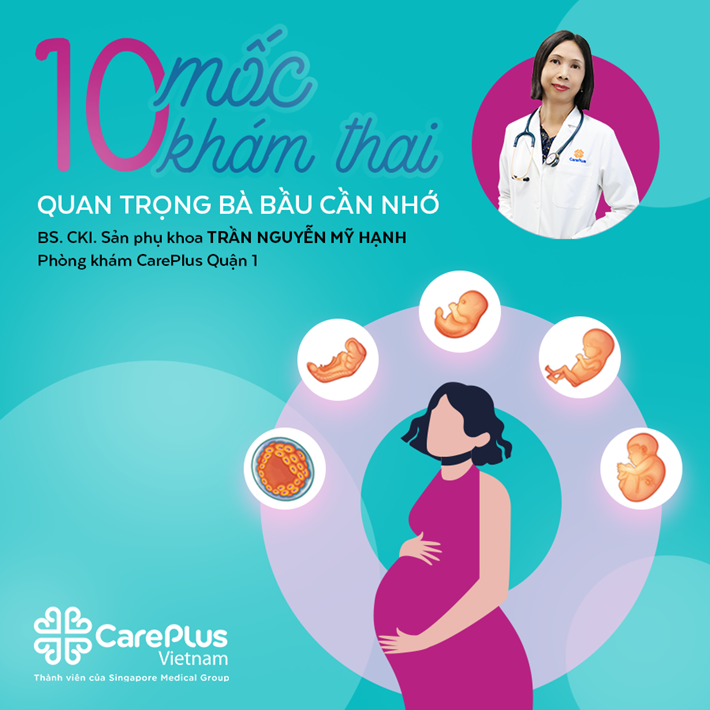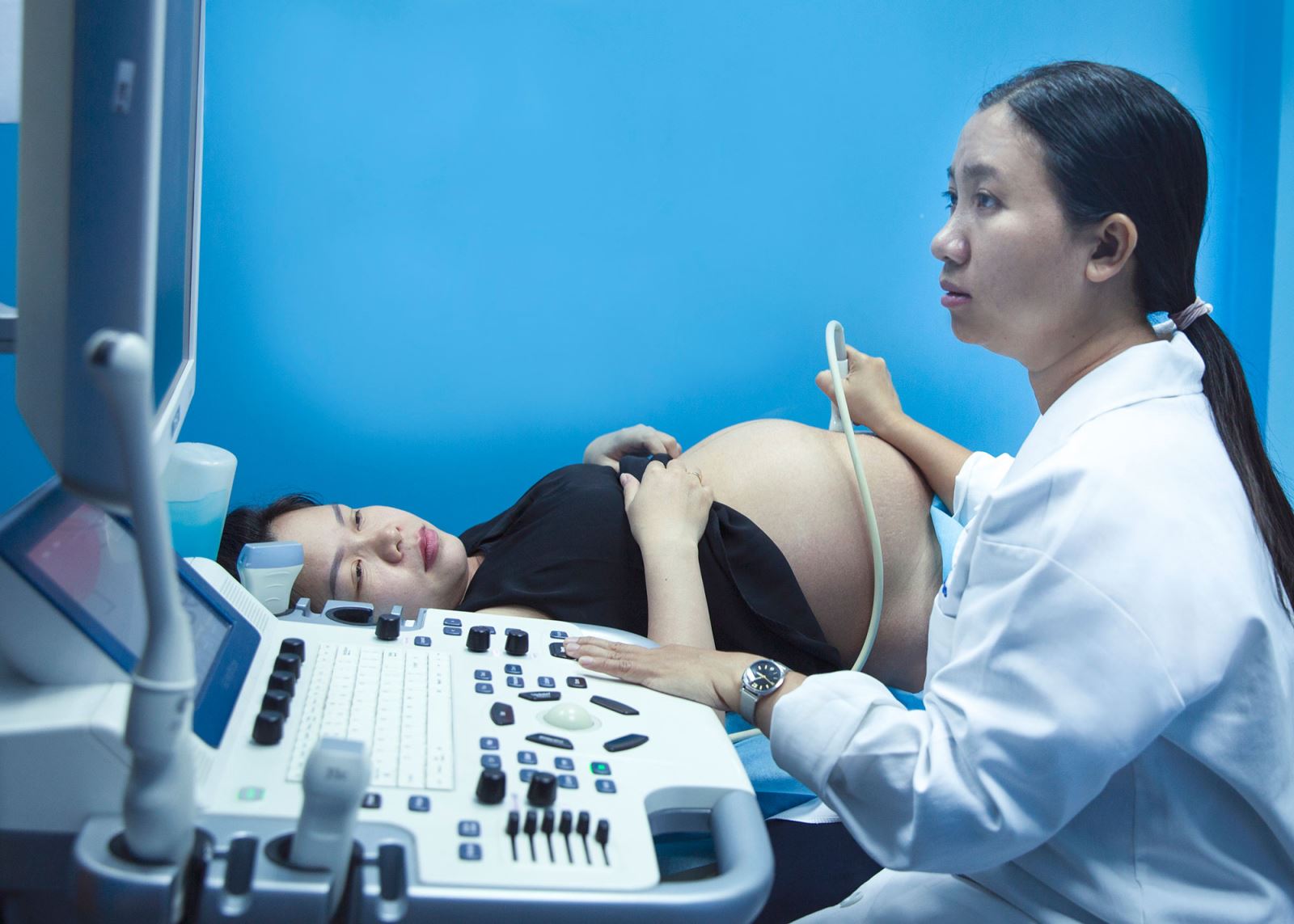10 important milestones pregnant women need to remember
The first prenatal visit is very important. Pregnant women should remember 10 antenatal check-up milestones and implement the schedule to promptly detect abnormalities during pregnancy.

2/24/2022 4:10:09 PM
The first prenatal check-up: The first prenatal check-up is usually 2-3 weeks after the period is late
During this prenatal visit, your doctor will perform some of the following assessments:
- Check your weight and height to calculate your body’s BMI to assess overweight and obesity. If there is an abnormality, the doctor will guide you on how to control your weight during pregnancy to minimize potential complications;
- Check pulse, blood pressure, cardiopulmonary. Assessment of mother’s health: internal and external diseases;
- Ultrasound to find the gestational sac, gestational age and pregnancy status in order to promptly detect abnormalities such as ectopic pregnancy, ectopic pregnancy, multiple pregnancies, threatened miscarriage, stillbirth...;
- Calculation of gestational age and due date;
- Perform blood tests to check for some diseases such as Hepatitis B, Syphilis, HIV/AIDS, Rubella... (in case of history of miscarriage, test more CMV, Toxoplasma) and test: blood count, blood type, Rhesus factor, urinalysis.
At this antenatal check-up, the doctor will advise pregnant women on how to supplement with essential vitamins and minerals during pregnancy, lifestyle advice, medications and foods to avoid during pregnancy.
2nd antenatal visit: from 11 to 13 weeks 6 days
- The doctor will check the weight, blood pressure and do urinalysis (10 parameters) to assess the mother’s health and the development of the fetus;
- The doctor will order an ultrasound to measure the nuchal translucency, measure the pulse index (PI) of the uterine arteries, and check for abnormalities that can be detected at this gestational age, such as anencephaly, umbilical hernia, bladder great…;
- Double test is a screening test for aneuploidies such as Down Syndrome (Trisomy 21), Edwards Syndrome (Trisomy 18), Patau Syndrome (Trisomy 13). For high-risk cases, the doctor will advise to test NIPT (non-invasive prenatal screening test) or chorionic villus sampling. The NIPT test has the outstanding advantage of being non-invasive, completely harmless to the fetus and can be performed as early as 8 weeks onwards;
- PIGF blood test: assess the risk of Preeclampsia.

3rd antenatal visit: from 14 to 22 weeks
- Check weight, measure blood pressure;
- The doctor will measure the height of the uterus to monitor the growth of the fetus, listen to the fetal heart;
- Urinalysis;
- If the pregnant woman has not been screened for aneuploidy in the first 3 months of pregnancy, the doctor will appoint a Triple test - performed from 15 to 18 weeks gestation;
- Prenatal consultation for pregnant women with high-risk screening results or abnormal fetal ultrasound findings;
- Detect maternal abnormalities
- Uterine isthmus: based on history, clinical and ultrasonography
- Preeclampsia: High blood pressure, Proteinuria
- Threat of miscarriage or threat of premature birth
- Get the first dose of VAT tetanus vaccine.
4th antenatal visit: from 22 to 28 weeks
- Check weight, measure blood pressure;
- Measure the height of the uterus to monitor the growth of the fetus, listen to the fetal heart;
- Urinalysis;
- Fetal morphology ultrasound (4D ultrasound) to screen for abnormalities (heart, limbs, abdomen, bones, brain, spine, kidneys...) and checks the position of placenta, the amount of amniotic fluid;
- Screening for gestational diabetes: performing a glucose tolerance test at gestational age from 24 to 28 weeks;
- 2nd dose of VAT tetanus vaccine. Administer at least 1 month (≥ 30 days) apart from 1st dose and 1 month before birth.
5th prenatal visit: from 28 to 32 weeks
- Check weight, measure blood pressure;
- Measure the height of the uterus to monitor the growth of the fetus, listen to the fetal heart;
- Urinalysis;
- Color Doppler ultrasound (when ≥ 28 weeks gestation) in the following cases:
- Suspected intrauterine growth retardation (mother weight gain is slow, uterine height does not increase, fetal biological measurements do not increase after 2 weeks).
- Gestational hypertension.
- Twins with one placenta.
- Gestational diabetes…
- Repeat ultrasound every 2 weeks or when showed.
- At least 1 ultrasound at 32 weeks gestation to determine fetal position, amniotic fluid volume, placental position, assess fetal development. At this ultrasound, it is possible to detect late-onset fetal abnormalities such as intestinal obstruction, ventriculomegaly, fetal infection...
6th and 7th prenatal visit: from 32 to 36 weeks
- At this stage, pregnant women will have antenatal check-ups every 2 weeks.
- Check weight, measure blood pressure;
- Measure the height of the uterus to monitor the growth of the fetus, listen to the fetal heart;
- Urinalysis;
- Guide pregnant women to count fetal movements;
- Perform a Non-stress test to assess fetal health.
8th, 9th, 10th antenatal visit: from 36 to 39 weeks
- At this stage, pregnant women will have a prenatal check-up once a week.
- Besides the same examination in the second trimester of pregnancy, from 36 weeks onwards, the doctor will determine the fetal position, estimate the fetal weight, evaluate the pelvis, predict the normal delivery or difficult birth;
- Instructing pregnant women to count fetal movements, abnormal symptoms requiring immediate hospitalization such as vaginal bleeding, amniotic fluid, intermittent abdominal pain, edema, headache, dizziness...;
- The doctor will advise pregnant women on how to recognize the signs of labor so that they can be hospitalized in time

CarePlus - A reliable place for antenatal care and vaccinations
In Ho Chi Minh City, many pregnant women have chosen CarePlus International Clinic System for full examination and vaccination during pregnancy. Coming to CarePlus, pregnant mothers do not have to wait for hours, and receive dedicated advice from doctors to give themselves and their families absolute peace of mind.
Outstanding advantages of antenatal care and vaccination services at CarePlus:
- A team of leading, experienced and highly specialized specialists in Obstetrics and Gynecology directly examines and advises;
- The procedure is simple, does not take much waiting time, helps pregnant women feel comfortable and comfortable. the
- Spacious facilities and modern equipment. Direct insurance payment system and many flexible and convenient payment methods.
In addition, pregnant women can actively vaccinate according to the doctor’s prescription. Contact CarePlus International Clinic for consultation and appointment of the most suitable vaccination schedule for your condition. Please call Hotline 1800 6116 or leave a message on website www.careplusvn.com for detailed advice and appointment.